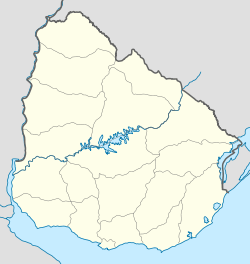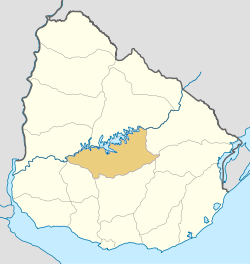Villa del Carmen
| Villa del Carmen Carmen | |
|---|---|
| Town | |
 Villa del Carmen | |
| Coordinates: 33°15′0″S 56°1′0″W / 33.25000°S 56.01667°WCoordinates: 33°15′0″S 56°1′0″W / 33.25000°S 56.01667°W | |
| Country |
|
| Department | Durazno Department |
| Founded | 1874 |
| Population (2011) | |
| • Total | 2,692 |
| Time zone | UTC -3 |
| Postal code | 97000 |
| Dial plan | +598 4365 (+4 digits) |
Villa del Carmen or Carmen is a town in Durazno Department of central Uruguay, the third largest populated place in the department, after Durazno and Sarandí del Yí.
Location
The town is located on the intersection of Routes 14 and 42, about 55 kilometres (34 mi) east of the city of Durazno.
History
Carmen was founded on 10 June 1874 by a decree of President of Uruguay José Eugenio Ellauri. A principal contribution to the town's economic development was the carpentery industry, as well as the wines produced by André Faraud in the beginning of the 20th century.[1]
On 4 July 1908, its status was elevated to "Pueblo" (village) and was given the name "Pueblo del Carmen" by the Act of Ley Nº 3.305. On 29 April 1975, its status was raised to "Villa" (town) by the Act of Ley Nº 14.363.[2]
Population
In 2011, Villa del Carmen had a population of 2,692.[3]
| Year | Population |
|---|---|
| 1908 | 3,598 |
| 1963 | 2,356 |
| 1975 | 2,410 |
| 1985 | 2,208 |
| 1996 | 2,284 |
| 2004 | 2,661 |
| 2011 | 2,692 |
Source: Instituto Nacional de Estadística de Uruguay[4]
Noted features
Parque Francisco Davant is named after Francisco Davant, a local political figure distinguished by his sponsorship of tree planting, serves local residents and tourists. The park contains a variety of trees, the planting of which date from the 1950s.[5]
Places of worship
- Parish Church of Our Lady of Mt. Carmel (Roman Catholic)
References
- ↑ Tourist guide info
- ↑ "LEY N° 14.363". República Oriental del Uruguay, Poder Legislativo. 1975. Retrieved 3 September 2012.
- ↑ "Censos 2011 Cuadros Durazno". INE. 2012. Retrieved 25 August 2012.
- ↑ "Statistics of urban localities (1963–2004)" (PDF). INE. 2012. Retrieved 3 September 2012.
- ↑ "Parque Francisco Davant". Durazno Department. Retrieved 27 June 2011.
External links
| ||||||||||||||
